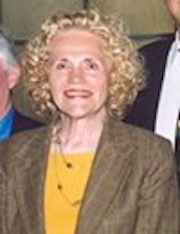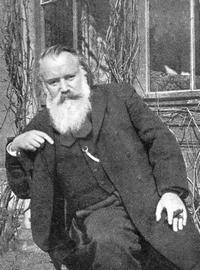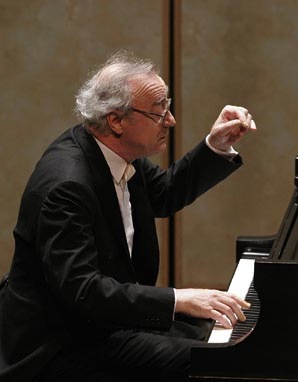The Well-Tempered Ear
Classical music Q&A: What makes Brahms’ Piano Concerto No. 2 so great? French pianist Philippe Bianconi discusses his upcoming performances of it this weekend with the Madison Symphony Orchestra. Plus, the memorial performances for singer Ilona Kombrink are this Sunday afternoon.
3 Comments
ALERT and REMINDER: Ilona Kombrink (below), UW Emeritus Professor of Voice, passed away on Friday, August 9, 2013 in Stoughton, Wisconsin, at the age of 80. A Memorial Concert and celebration of Ilona’s life will be held on this Sunday, October 20, 2013 at 3 p.m. in the Grand Hall at Capitol Lakes Retirement Community, 333 West Main Street, Madison. The public is invited with no formal reservations necessary.
A member of the University of Wisconsin-Madison voice faculty from 1967-2003, “Ms. K” counted among her students hundreds of singers and teachers working all over the world today. She performed frequently in her own recitals and collaborated often with many of her UW faculty colleagues on and off-campus. She was beloved in the wider Madison community for her uncompromising vocal artistry, and was featured in appearances with Madison Opera, Madison Symphony Orchestra, the Capitol City Band, and others.
Among the performers will be former students: Kathleen Otterson (Edgewood College), Margaret (Peggy) Walters, and Daniel Johnson-Wilmot (Viterbo University); UW colleagues: Professor Howard Karp (piano) and Professor Parry Karp (‘cello); Professor Karlos Moser (opera); and Professor Tyrone Greive (violin). Participating pianists include Michael Keller, Bruce Bengtson, Michael Ross, Janet Smith, and Melinda Moser. UW Professor Mimmi Fulmer, former student Marcia Roberts McCoy, and Professor James Latimer will offer remembrances. A reception will follow in the Capitol Lakes Encore Room.
By Jacob Stockinger
French pianist Philippe Bianconi (below), a favorite of Madison audiences, returns this weekend for three performances, with the Madison Symphony Orchestra, of the towering Piano Concerto No. 2 in B-flat Major, Op. 82, by Johannes Brahms.
The program also includes Claude Debussy’s famous tone poem “La Mer” and Benjamin Britten’s “Variation and Fugue on a Theme of Henry Purcell,” which the composer also used in the popular “The Young Person’s Guide to the Orchestra” (that will be performed at the MSO’s fall school concerts) and which will mark the centennial of the composer’s birth.
Performances, under the baton of MSO music director John DeMain, are in Overture Hall in the Overture Center at 7:30 p.m. on Friday; 8 p.m. on Saturday; and 2:30 p.m. on Sunday.
Tickets are $13.50-$82.50. For more information, visit: http://www.madisonsymphony.org/bianconi
For program notes by J, Michael Allsen, who plays trombone in the orchestra, visit:
http://facstaff.uww.edu/allsenj/MSO/NOTES/1314/2.Oct13.html
For more about Philippe Bianconi, who was born in Nice in 1960 and is the new director of the famed American Conservatory in France, visit: http://www.philippebianconi.com
To The Ear, Bianconi – who won a silver medal in the Seventh Van Cliburn International Piano Competition in 1985 – is a rare find: an outstanding virtuoso pianist who is also a poetic and complete musician in almost any repertoire, not just French music. I find his Rachmaninoff Rhapsody as convincing as his Debussy Preludes.
Bianconi (below) recently agreed to an email interview:
How do you rate the Brahms Piano Concerto No. 2 among the other standard or popular concertos in the repertoire and in your own preferences?
I am not so sure that the Brahms Second Piano Concerto belongs to the most standard repertoire or to the most popular concertos, but it is certainly considered one of the great masterpieces of the kind.
In my own preferences, it stays at the very top. As a matter of fact, if I were pressed to choose one piano concerto for a desert island, my choice would be Brahms second. (Of course, I’d be devastated to leave behind a number of other great concertos!)
What makes it do great or special for you? What role has it played in your career? Do you play a lot of other Brahms and what do you like about Brahms?
There are many reasons that make it so special in my own pantheon, but the main one will seem a little odd: to me this concerto is not really a concerto – it is really a symphony with principal piano.
It has four movements, like a symphony, and everything about it — the structure, the texture, the way the piano is integrated into the orchestral fabric i– s very symphonic. And that is what I love about it: I have the feeling I’m playing in a Brahms symphony !
I don’t think it has played a particular role in my career, but every time I had the opportunity to play this piece was a great moment of happiness.
The sheer beauty of this music is simply overwhelming. And I don’t know many concertos that have such a great range of moods and emotions.
There is such grandeur and majesty in the first movement, it’s like climbing a mountain in the Alps, and when you get to the top, you discover a panorama of breathtaking beauty. Then there is the dark and violent passion burning in the second movement.
Then comes the sublime slow movement with the unforgettable solo of the cello that brings tears to my eyes every time. And finally, the lightness, the grace, the spirit of the last movement, in great contrast with the other movements, in the pure tradition of Haydn, even with the gypsy touch of the second theme.
This concerto is like a fabulous journey.
I have played a lot of other music by Brahms (below), including most of the chamber music with piano, and among the music for solo piano, I have a deep love for his late cycles. To me, Brahms is a true romantic at heart. He explores such a variety of feelings: passion, lyricism, dreamy intimacy, stormy conflicts, and it is all molded in classical form, and that is what gives his music such emotional power.
I know that one very well-known pianist said he had to perform it more than 200 times live before recording it. What makes the Brahms Second so challenging? Technical difficulties? Interpretive difficulties? What would you like the audience to listen for in your performance?
This concerto is very challenging for many reasons.
It is very long, between 45 and 50 minutes depending on the tempi chosen. It requires great strength, especially in the first two movements. Of course you must find a natural and relaxed strength in order to maintain a large, singing tone all the time. If you force or bang, the sound becomes ugly and it’s just unbearable.
The technical difficulties are numerous: the horrendous chords and jumps, the runs in double notes. There are also very “un-pianistic” things too. Because the piano is really part of the orchestra, and conceived in orchestral terms, in “coloristic” terms, and in relationship with the other instruments, certain things are technically very strange and awkward. Alfred Brendel (below) used to talk about the “pianistic perversions” of Brahms’ Second Concerto.
Then of course, the interpretative challenge is great too, and also because of the integration of the piano in the orchestra. You cannot think as a “soloist” when you play it. From beginning to end, you must have in mind the structure of the whole piece and the full orchestral texture, even in the solo passages. As a matter of fact, the collaboration with the conductor is absolutely crucial in this piece.
You have become a favorite pianist of Madison audiences and the Madison Symphony Orchestra and conductor John DeMain? How do you feel about the city and its audiences as well as about the orchestra?
I am so happy to come back to Madison. It’s a beautiful, lively city, and I love coming here. And I love the audience too. They are always so warm and enthusiastic.
I have played a number of times with the Madison Symphony and John DeMain (below, in a photo by Prasad), and every time has been a great musical and human experience. I feel a little bit like I’m coming back home to my family.
As I said, when you play Brahms Second, collaborating with the conductor is very important, so you can imagine how I look forward to performing it with John DeMain. I know it’s going to be one of the best experiences of my life with this piece.
What are your current projects and plans for concert performances, recordings, etc.?
In the next few months, I have some recitals planned in Europe, and in February I will be back in the States for a series of concerts with the Buffalo Philharmonic and Joann Falletta, playing Rachmaninoff’s Piano Concerto No. 3 in Buffalo and then on tour in Florida. Then I will be playing the Grieg Concerto in Santa Rosa, California, with the Santa Rosa Symphony and Bruno Ferrandis. It will be a great month of February for me.!
Last week, I recorded my first Chopin CD, which should be released in 2014. It’s with the same label (La Dolce Volta) I recorded the complete Debussy preludes (below, in a YouTube video) last year. It’s a new and energetic label and I’m really happy to work with them.





